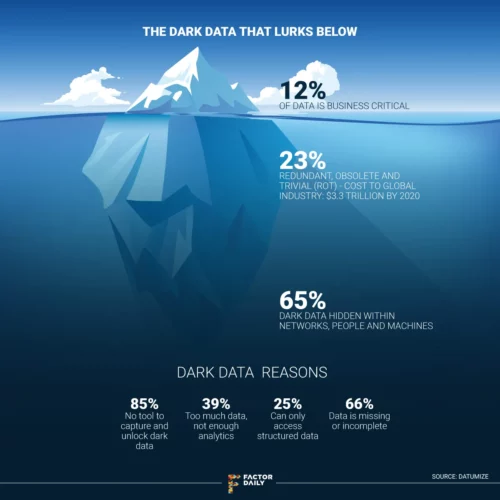What is Dark Data and Why Does It Matter to Public Agencies?
What is Dark Data?
Dark data refers to the massive amount of information that is generated and collected by organizations, including public agencies, but goes unused and unanalyzed. This data can come from various sources such as manual surveys, counts, emails, sensors, underlying report data, and proprietary systems. Despite its potential value, dark data often remains untapped because it is difficult to access, process, and make sense of it.

Source: FactorDaily / Datamize
The Rise of Dark Data
The exponential growth of data in recent years has only added to the challenge of managing dark data. According to IDC, the world’s data will grow from 33 zettabytes in 2018 to 175 zettabytes by 2025, with over 80% of this data expected to be dark. As a result, public agencies are facing increasing pressure to find ways to extract insights and value from this vast pool of information.
One of the main reasons that dark data remains unused is that it often exists in unstructured or semi-structured formats, such as text or images, making it difficult to analyze using traditional data processing methods. Additionally, privacy and security concerns can make it challenging to access and use the data, particularly when it contains sensitive information.
Benefits and Considerations
However, the potential benefits of unlocking ‘the data that lurks below’ are significant. With thorough analysis, organizations can gain new insights into perpetuating challenges and needs of residents. They can also identify new opportunities and make data-driven decisions that can improve efficiency and drive outcomes and goals for their communities.
To effectively manage this data, organizations need to adopt modern data management and analysis techniques. This may involve investing in new technologies such as artificial intelligence, machine learning, and natural language processing to extract insights from unstructured data. Additionally, organizations should establish clear data governance policies that balance the need to access and use dark data with privacy and security concerns.
Looking Ahead
In conclusion, dark data represents a massive opportunity for public agencies to extract new insights and drive growth. However, unlocking its potential requires a change in how organizations manage and analyze their data. By adopting modern data management techniques and establishing clear data governance policies, public agencies can ensure that they are making the most of their data, regardless of whether it is in the light or dark.
Talk to UrbanLogiq today about how we’re helping public agencies get on top of their dark data! Contact us today to book a 30-minute demo.



